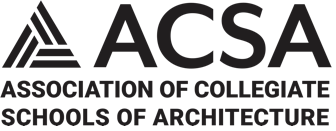
JOINT STATEMENT | PROHIBITIONS ON DIVERSITY, EQUITY, AND INCLUSION WILL LIMIT THE PROFESSIONS
Washington, D.C. September 21, 2023
The planning, design, and use of built and natural environments have direct and indirect impacts on people. Competent practitioners of architecture, landscape architecture, urban planning, and interior design must understand the histories of their profession and of the communities with which they will work. They must also be able to understand the impact of their work on people and communities as a result of practice today and in the future. Practitioners must understand the factors that affect vulnerable people and communities, including people of color, women, LGBTQIA people, and people with disabilities. No understanding is fully possible without access to educational information and discussion about social factors including privilege, bias, discrimination, sexism, and racism, among others.
“This united declaration stands as a strong objection to the legislation that silences educators from sharing the histories of the architectural profession. Practitioners, educators, and students must be granted access to the complete narrative. Being privy to only a portion of the story significantly disadvantages us all,” Mo Zell, 2023-24 ACSA President.
The boards of directors of the four organizations representing university programs and educators in architecture, landscape architecture, planning, and interior design—ACSA, CELA, ACSP, and IDEC— jointly communicate our opposition to any legislation that prevents educators from teaching and sharing complete and accurate knowledge about the built environment for the purpose of shielding students from “divisive” or “disagreeable” content related to the impact of race and racism in American and global society, as well as other pedagogy related to gender and LGBTQ+ identities. Such legislation has already been passed in Arkansas, Florida, Iowa, South Dakota, and Virginia, and other moves are underway. These laws serve to suppress student exploration of pressing issues that affect the country and that are essential to preparing future practitioners in the built environment disciplines.
The decisions to eliminate certain sectors of discourse in public institutions is especially concerning, because they impinge on students’ right to free speech, on the basic principles of faculty’s academic freedom, and on the ability of American citizens to participate fully in democratic use of our shared resources. Limited access to educational resources in K-12 education also impinges on students’ access to future educational opportunities.
We call on federal, state and local governments to respect the professional expertise of educators at all levels in preparing for the next generation of practitioners. We call on Federal, State and local governments to support educators as they provide students of all ages and backgrounds with the proper skills for emerging technologies.
“This united declaration stands as a strong objection to the legislation that silences educators from sharing the histories of the architectural profession. Practitioners, educators, and students must be granted access to the complete narrative. Being privy to only a portion of the story significantly disadvantages us all,” Mo Zell, 2023-24 ACSA President.
The boards of directors of the four organizations representing university programs and educators in architecture, landscape architecture, planning, and interior design—ACSA, CELA, ACSP, and IDEC— jointly communicate our opposition to any legislation that prevents educators from teaching and sharing complete and accurate knowledge about the built environment for the purpose of shielding students from “divisive” or “disagreeable” content related to the impact of race and racism in American and global society, as well as other pedagogy related to gender and LGBTQ+ identities. Such legislation has already been passed in Arkansas, Florida, Iowa, South Dakota, and Virginia, and other moves are underway. These laws serve to suppress student exploration of pressing issues that affect the country and that are essential to preparing future practitioners in the built environment disciplines.
The decisions to eliminate certain sectors of discourse in public institutions is especially concerning, because they impinge on students’ right to free speech, on the basic principles of faculty’s academic freedom, and on the ability of American citizens to participate fully in democratic use of our shared resources. Limited access to educational resources in K-12 education also impinges on students’ access to future educational opportunities.
We call on federal, state and local governments to respect the professional expertise of educators at all levels in preparing for the next generation of practitioners. We call on Federal, State and local governments to support educators as they provide students of all ages and backgrounds with the proper skills for emerging technologies.

ACSA. The mission of the Association of Collegiate Schools of Architecture is to lead architectural education and research. Founded in 1912 by 10 charter members, ACSA is an international association of architecture schools preparing future architects, designers, and change agents. Our full members include all of the accredited professional degree programs in the United States and Canada, as well as international schools and two- and four-year programs. Together ACSA schools represent some 7,000 faculty educating more than 40,000 students. ACSA seeks to empower faculty and schools to educate increasingly diverse students, expand disciplinary impacts, and create knowledge for the advancement of architecture. For more information, visit www.acsa-arch.org.

CELA. The Council of Educators in Landscape Architecture (CELA) can trace its beginnings to 1920 and for more than ninety years it has been concerned with the content and quality of professional education in landscape architecture. The mission of CELA is to encourage, support and further education in the field of landscape architecture specifically related to teaching, research, scholarship, and public service. CELA is composed of virtually all the programs of higher learning in landscape architecture in the United States, Canada, Australia and New Zealand. There also are individual and institutional members, located internationally, who belong to the CELA family. For more information, visit thecela.org.

ACSP. The Association of Collegiate Schools of Planning (ACSP) is a consortium of more than 125 university departments and programs offering planning degrees as well as programs that offer degrees affiliated with planning. ACSP also has individual faculty, retired faculty, and student members. The majority of our school members are located in the U.S., but in Canada as well, and our individual members are from around the world. ACSP connects educators, researchers, and students, to advance knowledge about planning education and research. We are committed to promoting the field of planning as a diverse global community that works collectively toward healthy, equitable, and sustainable neighborhoods, cities, and regions. More about the ACSP.

IDEC. The Interior Design Educators Council (IDEC) is a professionally recognized association for interior design educators. IDEC has a predominantly North American membership base, organized around five geographic regions and comprised of nearly 700 members. Conceived in 1962, IDEC was named and formalized at its first conference in 1963 with the goal to network educators and strengthen interior design education. This broad purpose enabled IDEC’s founders to lay the groundwork for a long and significant history, one that has had a major impact on the interior design profession and influenced interior design education worldwide. IDEC’s mission is the advancement of interior design education, scholarship, and service. A membership organization, IDEC is recognized as the leading organization on interior design education. For more information, visit https://idec.org/.



